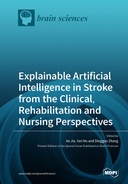Explore

Explainable Artificial Intelligence in Stroke from the Clinical, Rehabilitation and Nursing Perspectives
0 Ungluers have
Faved this Work
Login to Fave
As we know, strokes are one of the world's leading causes of death, and the cruel aspect of a stroke is that it leaves people with severe functional disability and/or cognitive impairment. Strokes have a significant impact on economies worldwide, as it is estimated that about 10% of the male population and 8% of the female population are affected by them. Such people need personal help in their everyday life and must be materially supported by social services. With the advancement of medicine, artificial intelligence, and new technologies have been developing rapidly and are gradually applied in diseases of the nervous system, increasingly helping diagnosis, treatment, rehabilitation, and prognosis of disease.This Special Issue has collected the 14 papers on artificial intelligence and new technologies in strokes, including in the aspects of diagnosis, treatment, prognosis, rehabilitation, and nursing. We welcome your reading.
This book is included in DOAB.
Why read this book? Have your say.
You must be logged in to comment.
Rights Information
Are you the author or publisher of this work? If so, you can claim it as yours by registering as an Unglue.it rights holder.Downloads
This work has been downloaded 139 times via unglue.it ebook links.
- 139 - pdf (CC BY) at Unglue.it.
Keywords
- 18F-fluorodeoxyglucose
- active rehabilitation training
- Aging
- artificial intelligence
- assessment
- automated system
- blood flows
- brain function
- brain–computer interface
- brain–computer interfaces
- Chemistry
- computer vision technology
- convolutional neural networks (CNNs)
- deep learning method
- disorders of consciousness
- DTI
- EEG
- electromyographic bridge
- Executive Function
- facial expression recognition (FER)
- facial paralysis
- Fugl-Meyer Assessment
- Gait
- Hand
- hand function rehabilitation
- hand rehabilitation
- hand rehabilitation robot
- Hemiplegia
- hypoxic ischemic encephalopathy
- immersive virtual reality
- laser speckle
- Mathematics & science
- Meta-analysis
- metabolic connectivity
- motor attempt (MA)
- motor function
- motor function assessment
- Motor Imagery
- motor task
- non-invasive brain stimulation
- Organic Chemistry
- overlapping time window
- peripheral magnetic stimulation
- positron emission tomography
- post-stroke cognitive impairment
- postural control
- randomized controlled trial
- Reference, information & interdisciplinary subjects
- Rehabilitation
- repetitive transcranial stimulation
- Research & information: general
- rTMS
- sensorimotor rhythm
- sensors
- spasticity
- Stroke
- stroke rehabilitation
- upper extremity
- upper limb
- upper limb rehabilitation
- Virtual reality
- vision transformer (ViT)
- wearable devices
Links
DOI: 10.3390/books978-3-0365-6838-6Editions

